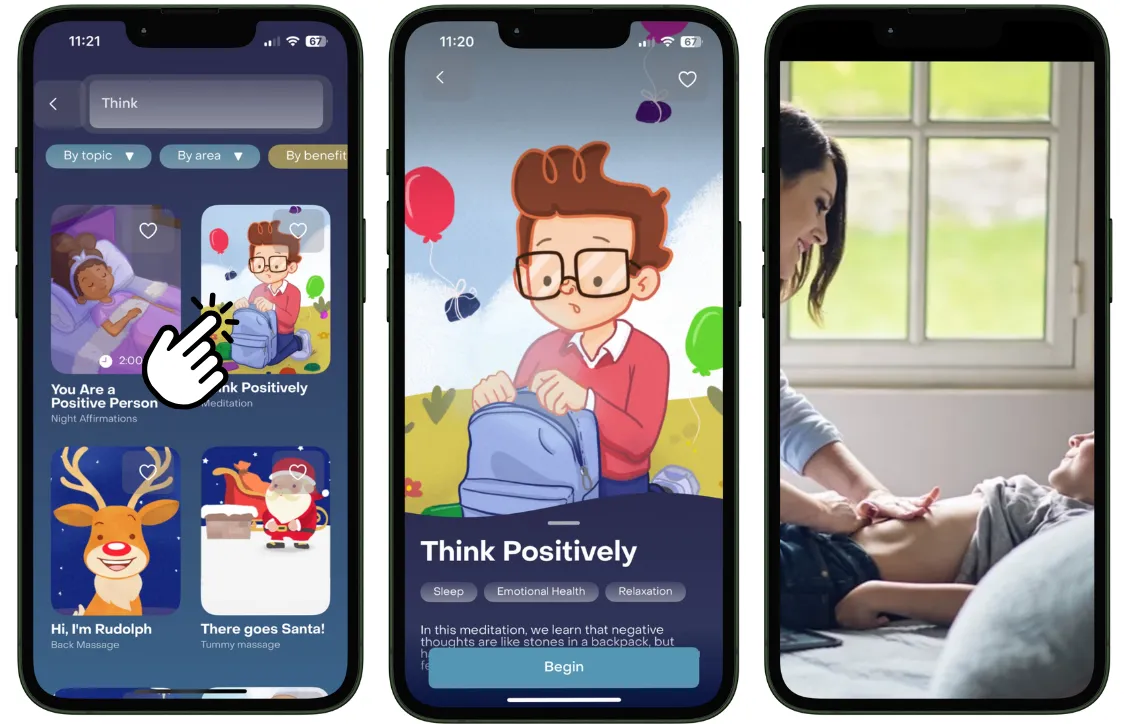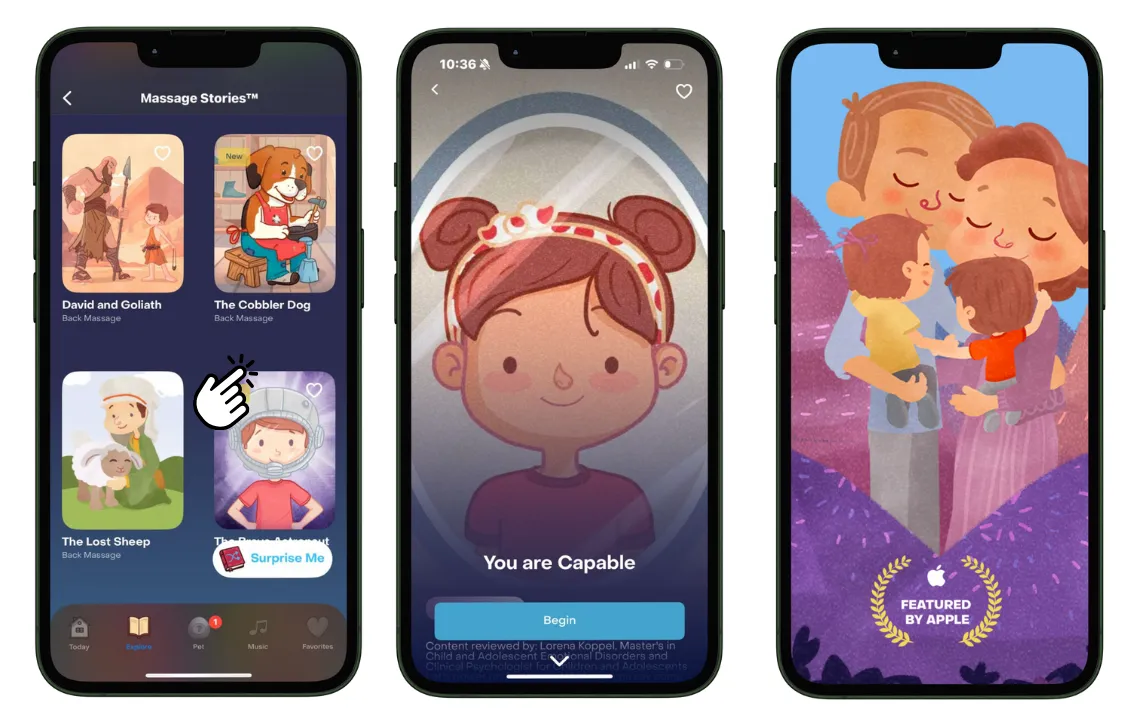Fostering a growth mindset in children is key to helping them embrace challenges and learn from mistakes.
These 15 fun and engaging activities are designed to encourage kids to develop resilience, perseverance, and a positive attitude toward learning and self-improvement.
By practicing these activities, children will better understand the power of "yet" and how to keep growing, no matter the obstacles.
1. Growth mindset storytime
Storytime is a powerful way to teach kids about the growth mindset through engaging and relatable stories.
The Johnson family had a big win with the “Think Positively” story from the Storybook app!
Their son, who was struggling with negative thoughts, really connected with the character's journey of changing how they think. By the end of the story, he was more confident and started focusing on the good things around him.
If you're looking for a way to help your kids shift their mindset and boost their emotional well-being, give Storybook a try! 🌟
It’s a fun and easy way to bring positive change into their lives. 💖

2. Growth mindset coloring pages
Growth mindset coloring pages are a creative and relaxing way to reinforce positive thinking.
These coloring pages often feature inspiring quotes, affirmations, or illustrations that encourage perseverance and resilience.
As children color, you can talk to them about the message on the page, like “Mistakes help me grow” or “I am capable of learning anything.”
3. Goal-setting jar
A goal-setting jar is a hands-on way to help kids set and achieve their goals while developing a growth mindset.
Provide a jar and small pieces of paper where kids can write down their goals or things they want to improve on, such as "I want to learn how to tie my shoes" or "I want to read one book this week."
As they work on their goals, they can add notes of progress or steps they've taken.
This visual reminder encourages them to keep working toward their goals and reminds them that growth comes with consistent effort and practice.
4. Praise the process game
The "Praise the Process" game helps children focus on the effort and strategies behind their work, rather than just the outcome.
Choose a task or activity, like drawing, building with blocks, or solving a math problem, and as the child works through it, provide specific praise for their strategies, effort, and perseverance.
For example, say things like, "I love how you tried different ways to solve that problem," or "You kept going even when it was tough!"
This reinforces the idea that success comes from hard work and persistence, helping children understand that the process is just as important as the result.
5. Affirmations audios for kids
Creating affirmation is a creative and creative activity that helps kids internalize positive beliefs about themselves.
The Thompson family had an amazing experience with the “You Are Capable” affirmation on the Storybook app!
Their son, who had been feeling discouraged at school, started to believe in his abilities again after hearing the affirmation. It helped him overcome his self-doubt and gave him the confidence to tackle challenges head-on. 💪
If you want your kids to feel empowered and confident, give Storybook a try! 🌟 It's a fun way to boost their emotional well-being and remind them that they are capable of anything. �

6. Try something new challenge
Encourage kids to step out of their comfort zone by taking on a "Try something new" challenge.
Each week, give them a new task or activity they've never done before, like trying a new sport, learning a simple craft, or tasting a new food.
This challenge helps children understand that trying new things may feel uncomfortable at first, but it’s a great opportunity to grow and develop new skills.
By doing these patience activities for kids, kids learn that mistakes are part of the process and that with practice, they can improve.
7. The “yet” game
The "yet" game is a simple yet powerful way to encourage a growth mindset.
When a child says, "I can't do this," you can teach them to add the word "yet." For example, "I can't do this yet!"
This small change in language helps kids understand that abilities are developed over time and effort, and that challenges are part of the learning process.
You can turn this into a fun game by giving them different tasks and encouraging them to say “I can’t do this yet” when they find something difficult, reinforcing the idea that with practice, they will improve.
8. Mistake of the day
The "Mistake of the Day" activity encourages kids to reflect on mistakes they made during the day and what they learned from them.
At the end of each day, sit down with your child and ask them to share one mistake they made and how they can use it as an opportunity for growth.
This practice, along with responsibility activities for kids, helps children understand that mistakes are not failures but stepping stones to learning and improvement.
It reinforces the idea that it's okay to make mistakes as long as we learn from them and keep trying.
9. Effort tracker chart
An effort tracker chart is a fun and visual way to help kids track the effort they put into tasks, rather than focusing only on the results.
Create a simple chart where kids can mark off their progress each day by showing how hard they worked on something, like completing a puzzle, practicing a sport, or studying for a test.
Perseverance activities for kids reinforce the idea that effort is just as important as success and encourages kids to take pride in their hard work.
It helps them see that progress comes from consistent effort and persistence, fostering a growth mindset.
.webp)
10. Growth mindset bingo
Growth mindset bingo is a fun and interactive way to encourage kids to adopt a positive and resilient attitude toward challenges.
Create bingo cards with various growth mindset actions, like “Try something new,” “Ask for help,” “Make a mistake and learn from it,” or “Praise someone else’s effort.”
Each time the child completes an action, they can mark it off on their card.
Once they get a bingo, celebrate their accomplishments!
11. Compliment circle
A compliment circle is a wonderful way to build positive connections and encourage a growth mindset.
Have the children sit in a circle and take turns giving a compliment to the person next to them.
Encourage compliments that focus on effort, perseverance, and positive attitudes, like empathy activities for kids:
“I admire how hard you worked on that project!” or “I love how you kept trying, even when it was tough!”
This activity helps kids recognize and celebrate the effort and growth in others, fostering a positive and supportive environment.
12. Fixed vs. Growth mindset sorting game
The "Fixed vs. Growth Mindset Sorting Game" is a fun and educational way to help kids understand the difference between a fixed mindset and a growth mindset.
Create two piles or areas, one for fixed-mindset statements and one for growth-mindset statements.
Examples of fixed mindset statements could be, “I’m not good at this,” or “I can’t do it.”
Growth mindset statements might include, “I can learn if I keep trying,” or “Mistakes help me grow.”
As the kids go through the statements, ask them to sort them into the correct piles. This interactive game helps them recognize how different thoughts and attitudes affect their ability to learn and grow.
13. Mindset role play
Mindset role play is a fantastic way to help kids practice applying a growth mindset in real-life situations.
Set up different scenarios where children can choose to act with either a fixed or growth mindset.
For example, one scenario could involve trying to solve a difficult puzzle, and the child would first act out giving up (fixed mindset), and then act out trying again, asking for help, or finding a new strategy (growth mindset).
This role play encourages kids to see how their thoughts and actions influence their success and learning.
14. My brain is like a muscle
Create a fun, interactive session where kids can compare their brain to muscles.
You can use visuals like an image or a simple craft showing a brain lifting a dumbbell to make the comparison more engaging.
Explain to the children that just like muscles, their brain gets stronger with practice.
When they challenge themselves by learning new things or solving problems, they are exercising their brains and helping them grow.
Reinforce the idea that consistent effort leads to growth, making them more capable of handling new challenges in the future.
This activity helps kids understand that their abilities improve with practice, just like muscles get stronger with exercise.
15. Growth mindset journal
A growth mindset journal is a great way for kids to reflect on their progress and challenges while developing a positive attitude toward learning with gratitude activities for kids.
Each day, encourage them to write about something they learned, a mistake they made and what they learned from it, or something they want to improve. This daily reflection helps them focus on their effort and growth, rather than just the outcome.
Final thoughts on growth mindset activities for kids
Growth mindset activities are an incredible way to help children develop resilience, perseverance, and a positive attitude toward challenges.
By incorporating activities like the "Yet" game, goal-setting jars, and mindset role plays, kids can learn to embrace mistakes as opportunities to grow and understand that effort leads to improvement.
These activities not only make learning fun, but they also help children build confidence in their abilities, encouraging them to keep trying and believing in themselves.

Written By
Entrepreneur mum. I created Storybook: Bedtime Stories the #1 app in over 90 countries. I have been able to help families with the app and through my social media influence. I also created a Facebook group with over 12,000 moms where we support each other.
References












